Dynamic training prepares physician for career in research
A surgeon is learning how to use data science skills to boost research and turn discoveries into practical treatments for patients.
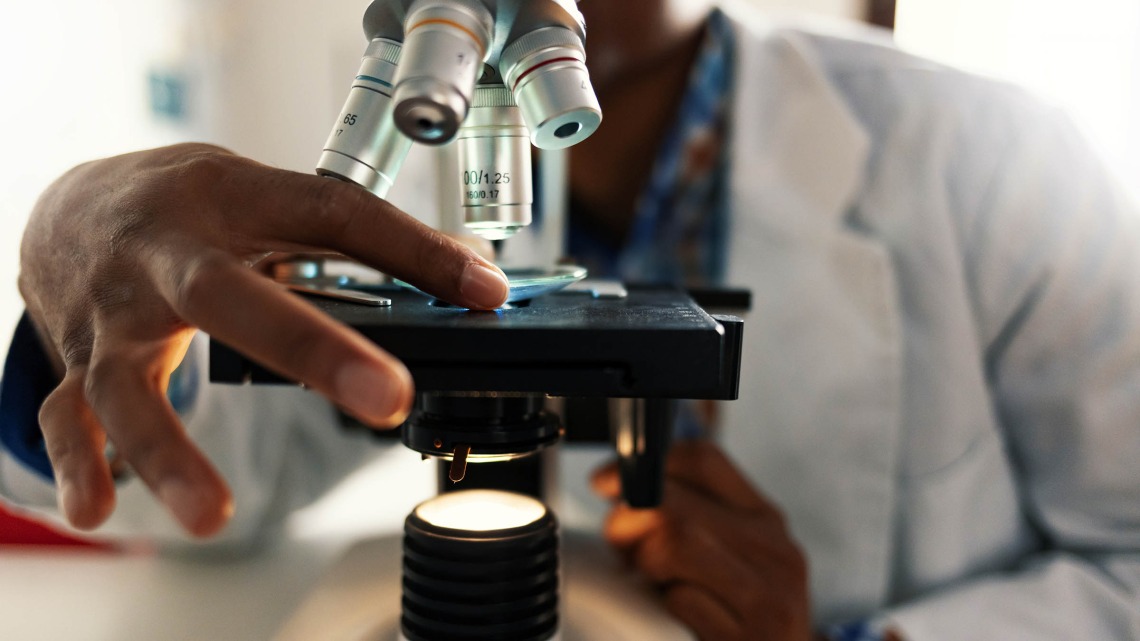
Chidiebere “Peter” Echieh, MD, FWACS, is enhancing his research capabilities with skills acquired in the Data Science Fellows program while also learning how to turn discoveries in the lab into practical solutions in the Clinical Translational Sciences program.
Chidiebere “Peter” Echieh, MD, FWACS, and his mother share a special bond, forged perhaps because they are both the youngest child in large families – Echieh is one of six siblings, and his mother is one of seven. They also share a common passion: caring for the sick.
Echieh remembers returning home from school and talking to his mother about her long day working as a nurse. On many occasions, he was able to watch her provide care.
“That really introduced me to medicine and wanting to help sick people,” Echieh said. “That was how I started falling in love with medicine.”
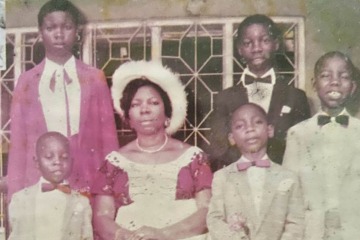
Chidiebere “Peter” Echieh, MD, FWACS, (front row, far left) is pictured with his mother and some of his siblings. He is the youngest of six: five boys and one girl.
Echieh, who is from Nigeria, went on to obtain his medical degree and become a cardiothoracic surgeon and fellow of the West African College of Surgeons. He chose the profession in part because of the well-documented need for more doctors and surgeons in his native country.
“Much the same way my mother was called to nursing, because of a need, I wanted to help fill a deficiency we had in surgeons. Cardiothoracic surgeons specializing in the heart, lungs and other chest organs were in even shorter supply, so I naturally gravitated in that direction,” he said. “Another major influence on me was taking care of my father when he fell ill. I saw firsthand what patients are going through in health care facilities and the need for improvement.”
Echieh eventually decided he could help more people by conducting scientific research, rather than seeing and treating one patient at a time as a clinician. His commitment to helping as many people as possible and taking research to new levels is evident in his decision to pursue a doctorate in Clinical Translational Sciences and enter the Data Science Fellows program.
What is clinical translational science?
Clinical translational science might sound complex, but at its core, it is simply about turning discoveries and observations in the laboratory into practical applications that can benefit patients. The field bridges the gap between basic research and clinical practice, and it can help speed up the development of new treatments, diagnostics and interventions.
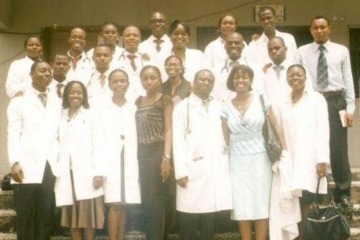
Echieh (front row, far left) received his medical degree from the University of Calabar, Nigeria.
“There are many steps before a discovery can become something useful. Many discoveries never make it into a doctor’s hands,” Echieh said. “For example, imagine all the information that has to transfer from discovering a biological target associated with a disease, to a biochemist finding a chemical that works on the target, to the pharmacologist who describes how it works on the body, to safety testing, and then eventually all the different phases of a clinical trial. There are so many points in this series of transfers where a discovery might not make it through to the patient.”
The Clinical Translational Sciences degree program trains students to be successful in addressing both clinical and basic science aspects of translational research. Students customize their elective coursework to obtain in-depth knowledge in a specific area such as immunology, neuroscience, cardiology, cellular and molecular medicine, pharmacology, or oncology.
The program, administered by the University of Arizona Health Sciences, began in the College of Medicine – Tucson and now resides in the College of Health Sciences. Clinical Translational Sciences is one of five graduate-level degree programs in the new college, which is dedicated to addressing critical health care needs in Arizona.
“By exposing our trainees to diverse subject matter experts that range in expertise from intellectual property to establishing and managing a startup company to planning and conducting clinical trials, we aim to provide the next generation of clinical and translational researchers a solid foundation to more easily bridge the gaps from bench to bedside,” said Julie Ledford, PhD, co-director of the Clinical Translational Sciences Graduate Program in the College of Health Sciences and associate professor of Cellular and Molecular Medicine at the College of Medicine – Tucson.
Using what he has learned
As part of the Clinical Translational Sciences curriculum, Echieh receives training in writing grant applications and presenting and publishing research findings.
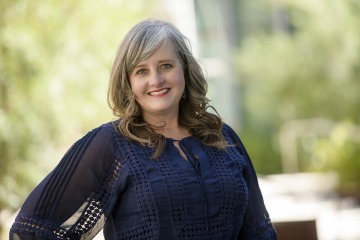
Julie Ledford, PhD, has more than a decade of experience mentoring and training medical students, graduate students, postdoctoral researchers and fellows. Her research focuses on how certain proteins and fats in the lungs play a role in pulmonary diseases and the immune system.
“That experience has helped me conceptualize an idea and frame the research process I used in developing a proposal for a National Institutes of Health grant,” said Echieh, who is awaiting word on whether his grant application will be awarded funding.
He is currently working on his doctoral dissertation, which builds on an analysis he performed and presented at the conference of the International Society for Heart and Lung Transplantation in Denver. The study analyzed the effects of a rule change in how heart transplants are allocated to patients. The paper, “Use of Mechanical Circulatory Support in Orthotopic Heart Transplantation: A 10-Year Analysis,” was published in the Journal of Heart and Lung Transplantation.
“We found that the new allocation system may be associated with a longer hospital stay, but also with improved mortality,” said Echieh, who performed the research under the mentorship of Robert Hooker, MD, FACS, former professor of cardiovascular and thoracic surgery at the Sarver Heart Center in the College of Medicine – Tucson.
“Dr. Echieh is gifted in his ability to formulate hypotheses, obtain the data and communicate the result,” Hooker said. “He is also a wonderful person and a joy to partner with in academic endeavors.”
Shaping the future of medicine
The Clinical Translational Sciences program also provided Echieh a foundation in biostatics. He expanded his knowledge of the field through the Data Science Fellows program.
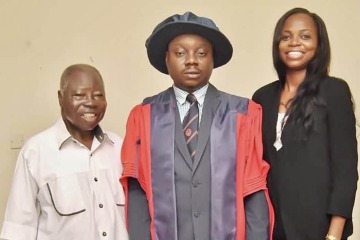
Echieh, dressed in doctoral regalia, commemorates receiving a West African College of Surgeons Fellowship with his wife and late father.
Data Science Fellows receive intensive training on how to apply data science skills to research. One of the program’s goals is to teach fellows techniques that can be shared with other researchers to accelerate progress toward health science research goals.
“Traditionally, you have the clinical researcher who creates the data and then the statistician who analyzes the data. That creates a bit of a dichotomy between the original idea for the research and how it is executed,” Echieh said. “By putting these two minds together into one person, you can get the best of both worlds.”
Ledford, one of Echieh’s mentors, says he is at the forefront of a new wave of research scientists who are employing advancements in data science to answer complex biological questions.
“Dr. Echieh is a shining example of a translational researcher with groundbreaking ideas in his area of focus,” Ledford said. “He asks questions that challenge the norm and reaches out to build teams to help move his ideas forward.”
The knowledge Echieh is gaining at UArizona Health Sciences will be invaluable as he works to solve global health care challenges through his current and future research. Echieh and his peers are well positioned to lead the way to improving patient care through advancements in research, thanks to the Clinical Translational Science and Data Science Fellows programs.
Our Experts
Julie Ledford, PhD
Associate Professor, Department of Cellular and Molecular Medicine, College of Medicine – Tucson
Co-Director, Clinical Translational Sciences Graduate Program, College of Health Sciences
Associate Director of Translational Research, Asthma and Airways Disease Research Center
Member, BIO5 Institute
Contact
Brian Brennan
UArizona Health Sciences
520-626-7301
brianbrennan@arizona.edu

